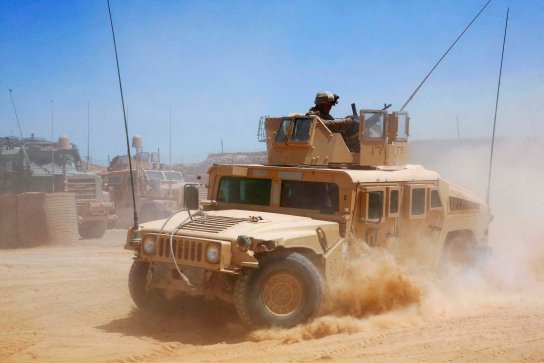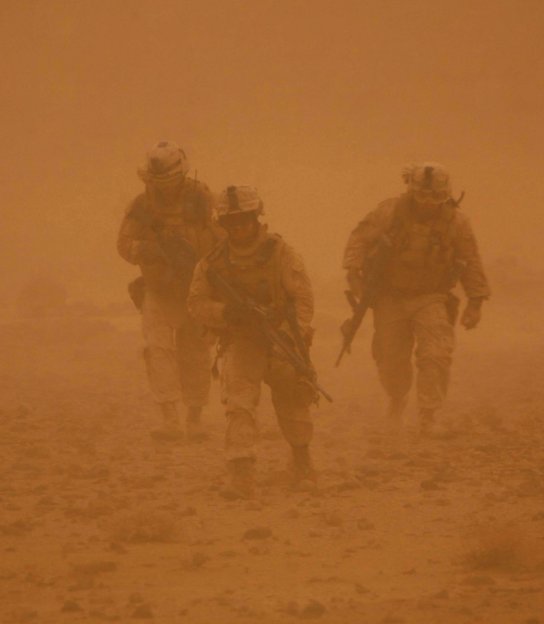« Gaffe Machine Biden Reveals Location of Secret VP Bunker | Main | 82nd Combat Aviation Brigade Arrive in Southern Afghanistan »
May 18, 2009
In Country with Our Marines in Afghanistan

Marines exit a forward operating base on a mounted security patrol in Bakwa, Farah province, Afghanistan. The Marines of Company I, 3rd Battalion, 8th Marine Regiment (Reinforced), the ground combat element of Special Purpose Marine Air Ground Task Force - Afghanistan, routinely patrol and interact with the local populace of Bakwa to maintain security in the area. U.S. Marines are in Afghanistan to reinforce success and sustain the momentum of the ongoing progress by alliance forces. Company I's mission is to conduct counterinsurgency operations while training and mentoring the Afghan national police.
Marines of Company I, 3rd Battalion, 8th Marine Regiment
Story by Lance Cpl. Brian D. Jones
BAKWA, Afghanistan
Through binoculars, a Marine spotted suspicious men in the distance. Over the radio, he passed the word. The security convoy circled around and pushed up to investigate. As they moved in closer, shots rang out from the ridge ahead.
The insurgents' rounds impacted close to the Marines' vehicles. On the order, the Marines returned fire causing the insurgents' retreat. The insurgents had completely fled before a quick-reaction force and air support arrived on scene. Shortly afterward, the Marines dismounted and went up the ridge. They found no traces of casualties, just fresh tracks and probable bunkers that may have been used as outposts.
This was not a typical patrol for the Marines of Company I, 3rd Battalion, 8th Marine Regiment (Reinforced), the ground combat element of Special Purpose Marine Air Ground Task Force – Afghanistan. They have successfully kept security under control in Bakwa, Farah Province, Islamic Republic of Afghanistan and such events are rare.
"None of them hesitated," said Cpl. Josh B. Reasbeck, the squad leader who led the patrol that day. "They were all employed the way they were supposed to be. They all did exactly what they were taught to do. I'm really proud of all them, and I have full confidence of their abilities."
Prior to alliance forces arriving in Bakwa, insurgent intimidation destroyed the community and pushed many people away. From testimonies of locals, the Marines know insurgents are still active in the area but have little influence.
"The security has increased tremendously with us being here and with the Afghan national police starting to step up," said Cpl. Chris L. Parra, a 3rd Civil Affairs Group non-commissioned officer attached to Co. I. "The people actually feel more secure now that they see the local government taking time to put in effort in providing security for the locals in the area."
The Marines of Co. I are operating from Forward Operating Base Bakwa and two combat outposts. They continually conduct mounted and dismounted security patrols, maintain quick reaction force teams and keep a 24-hour watch over the immediate areas.
"The threat out here is improvised explosive devices," said Reasbeck. "We don't really worry about direct fire so much."
Occasionally, the Marines will catch a local, who was persuaded by insurgents, planting an improvised explosive device in the road, said Reasbeck.
.

Marines in the middle of a sand storm make their way back to their vehicles after dismounting and patrolling a nearby mountain ridge in Bakwa, Farah province, Afghanistan, May 3. The Marines of Company I, 3rd Battalion, 8th Marine Regiment (Reinforced), the ground combat element of Special Purpose Marine Air Ground Task Force - Afghanistan, are operating in Bakwa to maintain security in the rural area. U.S. Marines are in Afghanistan to reinforce success and sustain the momentum of the ongoing progress by alliance forces. Company I's mission is to conduct counterinsurgency operations while training and mentoring the Afghan national police.
Marines Prepare for Counterinsurgency in Southern Afghanistan
Story by Cpl. Aaron Rooks
"Past history has shown that to fight and win in the south of Afghanistan, it is essential to know all aspects of the localized terrain, including human and political factors," Khodaidad said. "It is necessary to treat every village as a separate entity and know the personalities with influence there. Every village is a separate military campaign."
The Marines approached the firing line with ease, cooled by a calm breeze under blue skies all around, still quite familiar with the process to follow. The only difference this time, was that they were in an unfamiliar land, with an even more unfamiliar mission ahead.
Then the service members of Marine Expeditionary Brigade-Afghanistan began, each firing round after round from their respective M-4 Carbine and M-16 A-4 rifles, improving their accuracy with each shot.
But the rifle sight adjustment exercise lost its simplicity when a powerful sand storm engulfed the Marines and sailors as they lay across the firing line. Sand filled their mouths and nostrils, covered their weapons and eliminated all visibility of their targets ahead.
Being outside the protective wire for the first time, the events symbolized the unpredictability of Afghanistan, as well as that of their future missions to follow. The storm cleared off and returned for hours to follow. The sun later set under blue skies.
"Afghanistan can be extremely dangerous and unpredictable," said Maj. Tom Clinton, a senior watch officer with the brigade's command element. "Some call this country the 'graveyard of empires.'"
Clinton used this phrase in reference to other nations, such as Britain and Russia, which have tried, and failed, to gain a foothold in the country of Afghanistan by use of force. He said the U.S. cannot afford to make the same mistakes as their predecessors.
"We are not looking to stay here in Afghanistan," the Swampscott, Mass., native said. "We're looking to help the country and its people. The others were looking to build their empires. We have to allow the Afghan government and Afghan security forces to take things over. Yes, we want people to trust U.S. forces and their partners, but they need to trust their own government and security forces."
Afghanistan features many complexities that Marine veterans of Iraq are not familiar with. The land and terrain of Helmand province, MEB-Afghanistan's area of operations, may seem somewhat the same, but the needs and interests of Afghans; their culture, infrastructure and economy; are worlds apart.
Helmand is a land of extremes, according to the Helmand Provincial Handbook, which is used as a field guide for deployed internationals. It's the largest and arguably the most volatile province in Afghanistan today.
"At one time, we would engage no more than seven to 15 enemies in firefights," Clinton said. "Once in Garmsir, that number was at least if not more than 300."
Pashtuns constitute the overwhelming majority in Helmand, according to the manual, making up 94 percent of the population. The Pashtun ethnic group is unique in comparison to other groups around the world. Society is very conservative and strictly follows the Islamic religion.
The code of ethics within their tribe, Pashtunwali, meaning the way of the Pashtuns, stands out the most. The pre-Islamic code structures four of their core beliefs in society: nang (honor), melmastia (hospitality), nanawaty (sanctuary), and badal (revenge).
Pashtuns are known for their hospitality and will go to great lengths to treat their guests with honor and respect. At the same time, everything leads to honor. Any insults to themselves or their families can often lead to a desire for revenge. Their sanctuary beliefs will sometimes lead them to forgiveness of acts, if forgiveness is requested. But at the same time, Pashtuns are known for being quick to exact revenge for wrongdoings to restore their honor, even for a crime committed decades ago.
If Marines forces hope to stabilize the security situation in southern Afghanistan during their time here, it's necessary that they truly understand the people and their culture.
"The big challenge we face is that we want to help and do things right away," said Clinton, who spent much of his deployments around local Afghan leaders. "But in order to be successful, you have to get to know the people. It took me more than one month in one case just to get one of the village elders to speak to me. We must have patience."
Security has become the dominant issue in Helmand. According to the manual, there has been ongoing fighting in the province since 2006, which has produced significant loss of life and displacement of the local populace. The deterioration of security is most prominent in areas being contested by the Afghan government and insurgents.
The manual states that today, a relatively small percentage of Helmand locals actively support insurgent forces; another minority actively supports the Afghan government and coalition forces. The majority are neutral, simply trying to survive day to day and support their families.
The outcome of the brigade's counterinsurgency arguably sits in the hands of that majority.
The service members have been given Law of War and Rules of Engagement briefs in cohesion with weapons training to be better informed of the difficulties ahead and the issues to avoid.
The briefs touched on the basic issues of armed conflict, such as actions made in self defense, the prevention of unnecessary suffering, the use of force, humanity and the treatment of those wounded and captured.
1st Lt. Ian Mckinnon, operational law officer, MEB-Afghanistan, said the briefs would possibly be "the most important briefs the Marines will have while in Afghanistan."
Marines were advised on certain issues that will help them achieve success during operations, such as always displaying respect for Afghan traffic and pedestrians on roadways, avoiding reckless driving and always refraining from making any obscene gestures or insults to the local populace.
"Does shouting obscenities from the top of a turret hurt your mission?" asked Capt. Korvin Kraics, brigade operational law chief. "It certainly doesn't help you and there's certainly something to lose. You are not going to gain anything from that."
Recent studies identified different issues concerning U.S. and coalition forces that the Afghans have shown disapproval for. Afghans, according to the manual, have expressed dissatisfaction with international forces and have accused them of entering houses without permission of the home owner and lacking respect for Afghan culture and traditions. Mckinnon said, in Afghan culture, entering a house unannounced is a sign of disrespect, stating that making an uninvited entry is "a huge slap in the face," to locals.
But one complaint stands out the most, the alleged lack of security and rule of law.
Kraics said many of the choices the brigade is making for future missions to achieve U.S. goals in Afghanistan stem from lessons learned in Iraq's Al Anbar Province, where Marines have had clear successes in counterinsurgency.
.

Wild Thing's comment........
God bless these Marines and all our troops, and keep them safe.
I hate IED's!
Posted by Wild Thing at May 18, 2009 05:40 AM
Comments
"I hate IED's! " Well stated WT, I hate rockets too.
Let's pray for their success, their safety and a speedy return to the United States. God Bless the Devil Dogs.
Posted by: Jack at May 18, 2009 05:41 PM
("Does shouting obscenities from the top of a turret hurt your mission?" asked Capt. Korvin Kraics, brigade operational law chief. )
It may not help either but it sure makes you feel better and it don't change the situation but it is cathartic.
Posted by: Mark at May 18, 2009 07:05 PM
Jack,yesss and rockets too.
Posted by: Wild Thing at May 18, 2009 11:46 PM
Mark, I agree, I laughed when I read what
Capt. Kraics said. Let the Marines yell
any of that out if they want to.
Posted by: Wild Thing at May 18, 2009 11:49 PM
